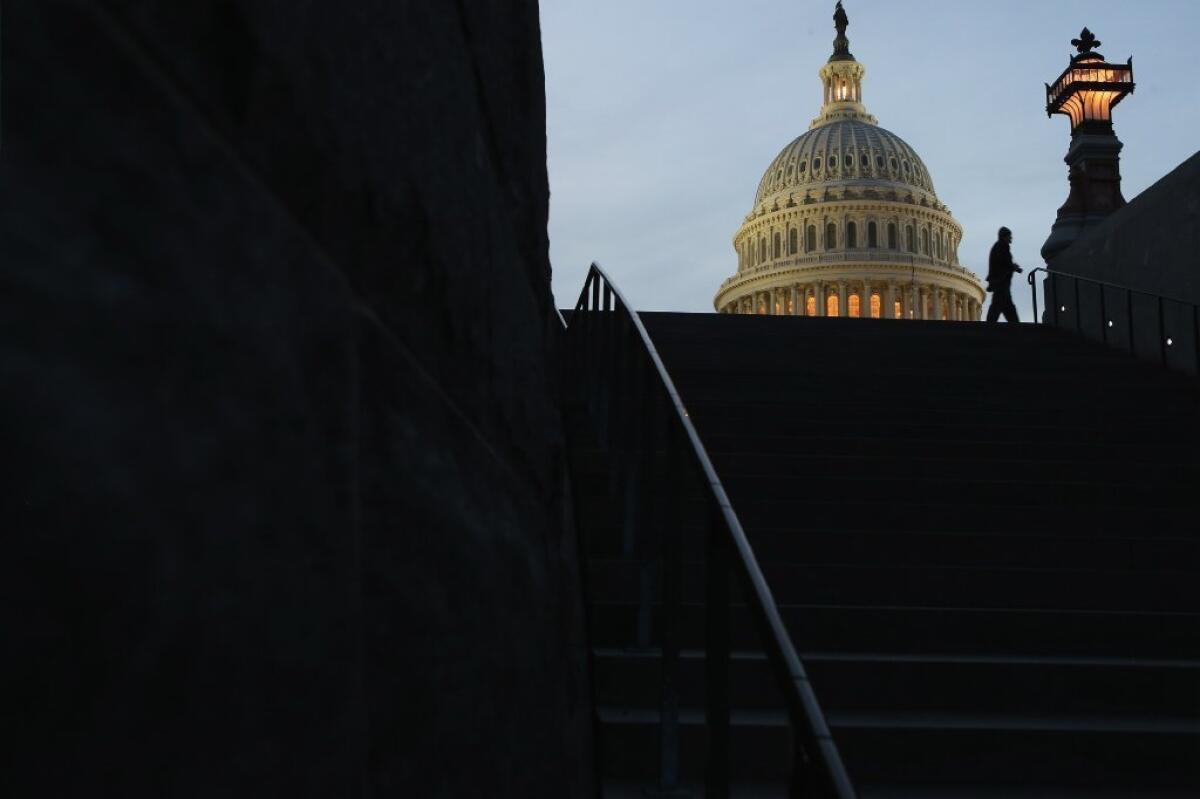SEAL who killed Bin Laden met with lawmakers to talk veteran care

Out of the service, out of the shadows: The Navy SEAL who reportedly killed Osama bin Laden in the world’s most famous secret raid has stepped a little closer toward the sunlight.
The unnamed shooter, profiled in a recent Esquire cover story that describes a post-military life without a pension or timely disability benefits, met with lawmakers Tuesday to discuss veteran’s care.
The SEAL, who didn’t qualify for a pension or health benefits for his family because he retired four years earlier than the Navy’s 20-year threshold, met with Sen. Bernard Sanders (I-Vt.), chairman of the Senate Committee on Veterans’ Affairs.
The SEAL’s disability claim with the military is reportedly caught up in a backlog with about 900,000 veterans who have to wait, on average, more than nine months for a determination on their claims.
“The fellow who killed Osama bin Laden is one of many people who are having these problems. It helps spotlight these problems,” Sanders told the Los Angeles Times on Wednesday, declining to go into detail about the meeting with the shooter, who has been worried about retaliation from Al Qaeda.
“He is one of 900,000, and he deserves justice, and those 900,000 deserve justice too,” said Sanders, who plans to hold hearings about the U.S. Department of Veterans Affairs backlog, which he called “my highest priority.”
The Center for Investigative Reporting, which co-published the story with Esquire and whose executive chairman, Phil Bronstein, wrote the piece, said on its website that the SEAL met with nine lawmakers from both parties Tuesday, along with a contingent that included Bronstein, representatives from Esquire and the SEAL’s former mentor.
“The Shooter is not as large as I expected,” Esquire editor David Granger wrote in a blog post. “He’s one of those guys who is sneaky big. He doesn’t stand out. In a suit, you can’t see his tattoos and you don’t realize how solid he is until you stand next to him.”
Granger reported that the SEAL told each legislator about “the lack of action” in providing protection for his family and that “the Shooter and the members of the group accompanying him presented the legislators with a three-part proposal for easing the transition out of the military for elite forces that would require no legislation.”
Those requests included a tiered pension plan that would begin after five years of duty, improved transition services for retiring veterans that include 18 months of total family healthcare, and departure pay based on length and type of service, according to Granger.
“It went really well,” the SEAL told Bronstein, who attended the meetings in his capacity as a journalist, according to the Center for Investigative Reporting. “I think we raised awareness. Now it’s just a question of acting.”
According to Bronstein’s original story, the SEAL had suffered from suicidal thoughts and a broken marriage, which were described as common among SEAL operatives. In an interview with “PBS NewsHour,” Bronstein described the SEAL’s financial situation as “not broke ... but insecure.”
Bronstein’s profile also initially claimed, falsely, that the SEAL got “nothing” from the government in retirement when all Iraq and Afghanistan veterans actually qualify for five years of health benefits. That claim drew private grumbles from officials in the Navy and the Department of Veterans Affairs.
Esquire also had to draw back an attack it made in a blog post against a Stars and Stripes reporter who had questioned the story’s healthcare claim -- a claim the magazine later was forced to correct.
Those initial waves of criticism may recede as attention turns to the government’s care of special forces operators, which the military has heavily relied upon for precise, dangerous fieldwork during years of unconventional warfare.
Gawker’s Tom Scocca, who criticized Esquire’s handling and framing of the story, wrote, “It does seem stupid and indefensible that this is our national policy -- that after years and years in the most dangerous combat zones, constantly risking physical and mental health, a SEAL should have to clock his full 20, same as a deskbound clerk.”
Eve Burton, a senior vice president of Hearst Corp., Esquire’s publisher, also attended the congressional meetings Tuesday, a Hearst spokesman said.
“The Navy SEAL in the Esquire article has come forward in an effort to assist all our special forces, who are American heroes often unknown to the public, to get the benefits and assistance they need to transition back to civilian life,” Burton told the Center for Investigative Reporting.
Perhaps in spite of military officials’ wishes -- and in spite of the Navy SEALs’ creed, which states, “I do not advertise the nature of my work, nor seek recognition for my actions” -- the as-yet-unnamed shooter joins a coterie of other special forces veterans who have refashioned their secret experiences for mass media.
Another SEAL Team 6 member on the mission to kill Bin Laden, Matt Bissonnette, saw his name go public just days after publishing a firsthand account of the attack in “No Easy Day” under a pen name. He and other special forces veterans helped consult on Electronic Arts Inc.’s “Medal of Honor Warfighter” video game.
SEAL veteran Chris Kyle was killed at a shooting range after publishing a memoir about his time as a spectacularly lethal sniper in Iraq, which also chronicled his psychological struggles after returning home from war. His accused killer, Eddie Ray Routh, a Marine reservist, had also been reportedly diagnosed with post-traumatic stress disorder, and Kyle’s death has since become a rallying cry for PTSD awareness.
Bin Laden’s killer, in Bronstein’s profile, described tensions inside his unit as suspicions arose that some members would seek publicity after the raid.
ALSO:
Report: SEAL who killed Bin Laden is struggling in civilian life
Former Californian Clint Romesha gets Medal of Honor for valor
SEAL sniper Chris Kyle gets public farewell at Cowboys Stadium
More to Read
Sign up for Essential California
The most important California stories and recommendations in your inbox every morning.
You may occasionally receive promotional content from the Los Angeles Times.











